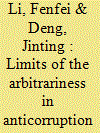| Srl | Item |
| 1 |
ID:
154821


|
|
|
|
|
| Summary/Abstract |
Through interviews and content analyses, this article conducted a comparative study of the drafting of China’s Internet Security Law (ISL) and E-Commerce Law (ECL). Although both had multiparty participants, they had very different substantive outcomes. Contrary to formalistic participation in the ISL, the ECL’s drafting involved considerable communication and negotiation. This difference was intended by the central party given its interests, and it was realized through its control over the scope, principle, direction and focus of the participation in the drafting, which is referred to as ‘leadership control’. This confirms the existence of consultative authoritarianism in China’s central lawmaking systems. The difference contributes to the theory by outlining indirect institutionalized control of the central party. This mode of control causes the authoritarian regime within the legal framework to occasionally be responsive and consultative, and at times fragmented, in realizing its interest in different situations. Such a polity still presents limits in terms of relieving contradictions in China. Power manipulation and attitudinal and fragmented problems can exaggerate such differences and result in the drafting of unreasonably polarized legislation. Interests and substantive power are essential for determining the limits and evolving directions of consultative authoritarianism. For further democratization, leadership control must be limited by the constitution and such limits must be afforded substantive power to become real and practical.
|
|
|
|
|
|
|
|
|
|
|
|
|
|
|
|
| 2 |
ID:
143773


|
|
|
|
|
| Summary/Abstract |
Based on interviews in local commissions of China’s Party discipline inspection (CDIs), this article investigates the effectiveness, internal limits and selectiveness of CDIs in the anticorruption campaign. It uses a micro-level analysis to explore the role of law in affecting the CDIs’ anticorruption work and concludes that local CDIs remain heavily affected by the same-level local governments, but are effective in combating local corruption due to recent reforms that have strengthened higher-level CDIs’ control over lower-level CDIs. The current internal decision-making systems of the CDIs make their anticorruption work heavily dependent upon the central leadership. Their work is still not institutionalized and relies heavily on higher-level intervention. Nevertheless, law played a crucial role by providing the bottom lines to set the decision-making standards at different stages. Legal reforms should aim to further clarify and lift these baseline standards.
|
|
|
|
|
|
|
|
|
|
|
|
|
|
|
|